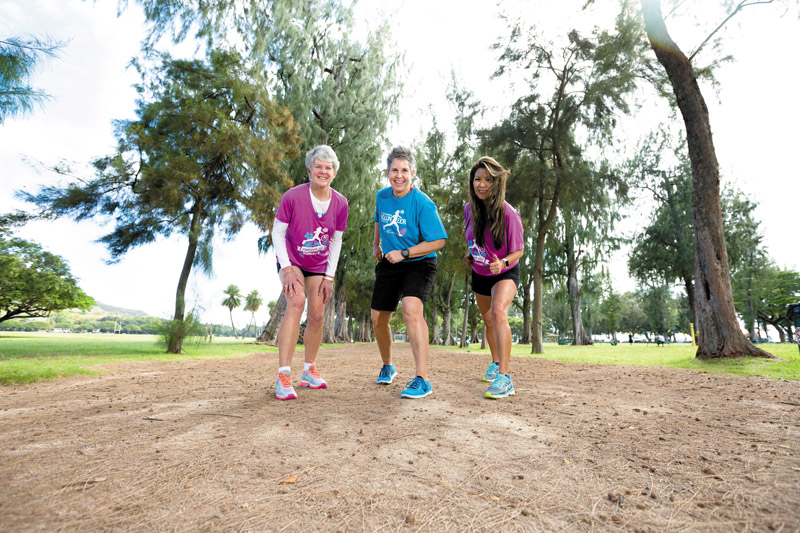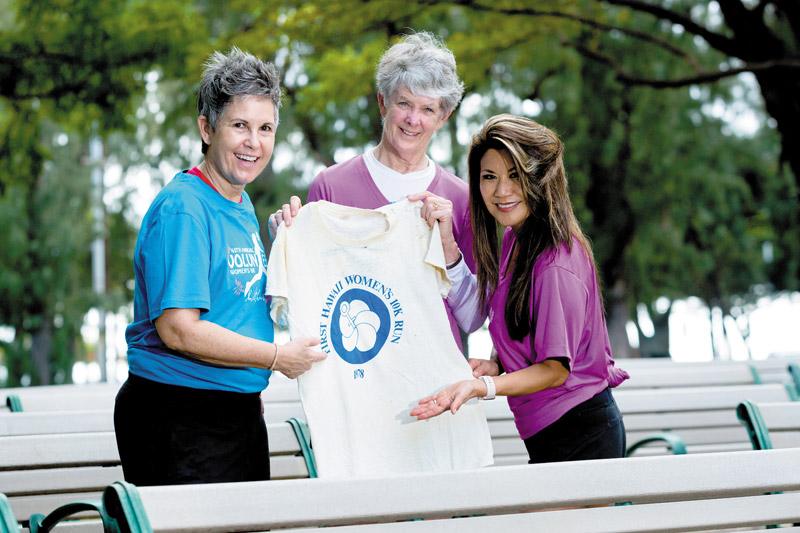Nevertheless, They Persisted

Three figures essential to the Hawaii Pacific Health Women’s 10K (from left): co-founder and 1978 race director Mimi Beams, current race director KC Carlberg and Straub Medical Center marketing manager Claire Tong, who assists in planning
Hawaii Pacific Health Women’s 10K celebrates 40 years as the state’s premier women-only race — and these ladies aren’t slowing down anytime soon
The progress of gender equality in the United States is both swift and slow.
Remember, most women could not vote in elections prior to 1920 — and, in fact, 25 senators voted against the 19th Amendment.
That’s not quite a hundred years ago.
The revolutionary Title IX, or Patsy Mink Equal Opportunity in Education Act, was passed in 1972, eliminating gender discrimination in federally funded education programs — including athletics.
Yet the battle goes on today, as women continue to fight for equality in all fields, even as female health care issues dominate the headlines.
Within this tapestry sits Hawaii Pacific Health Women’s 10K: a little race that’s done a lot of good for a lot of women since 1978.
Celebrating its 40th anniversary this year, some 1,500 women will gather March 5 on a 6.2-mile run from Kapiolani Park through Diamond Head, Kahala and back, all in the name of, as race co-founder Mimi Beams puts it, “women empowering women.”

Carlberg, Beams and Tong hold a finisher’s shirt from the first Women’s 10K in 1978
You have to understand, says Beams, that things were different 40 years ago.
“Running was really beginning to take off,” she muses. “We had some really spectacular women runners in Hawaii.”
Six years after Title IX, Beams, Bernie and Nancy Kilonsky, Val Godley, Diane Choy Fujimoto, Cynthia Tuttle, Alice Freitas and Sally Donellon — members of Mid-Pacific Runners Club — along with Cindy Dayl-ripple and Sue Strickland, decided that they ought to host their own race: one just for women.
“Way back when, men were the athletes, not the women. And (the time period) was really when women started being athletes on their own,” Beams says.
“We wanted to put on a women’s race because we wanted women to be able to cross the finish line and win, instead of a woman just showing up between.”
Race coordinator KC Carlberg agrees.
“Women are competitive,” she says. “People think women aren’t, but they’re very competitive as athletes. That’s traditionally looked upon as a negative, especially in business. Men and boys have always been the ones who are able to be competitive and assertive … so this is an opportunity to turn that around.”
So the race sprouted in that desire for a “safe space,” of sorts — a place women could feel free to compete, participate and move without judgment, supported all the while by their sisters-in-arms. (Fun fact: Legendary University of Hawaii women’s athletics director Donnis Thompson served as emcee for the first 10 years.)
“There’s no cutoff time, so most women go at their own pace,” Carlberg notes. “Sometimes they’re intimidated by that 10K (label), but they’ll do it because they know they can walk or run or whatever.”
And, she adds, most women do finish the race. Some women use the USA Track & Field Association-sanctioned course as a qualifying time for other marathons or runs.
There’s even a special bonus for the last finisher.
“We make a standing ovation for that final runner … sure, we have to carry on with the program, but to acknowledge that person and her achievement is what it’s all about,” Carlberg says.
“It sort of embodies that whole spirit of sisterhood and girl power.”
But never forget, this is the Hawaii Pacific Health Women’s 10K — and health definitely is first on the agenda.
A decade after the race’s inception, the founding committee turned planning over to Straub Medical Center, and later, after Straub merged with Kapiolani, Pali Momi and Wilcox hospitals, to Hawaii Pacific Health.
“Our mission is to create a healthier Hawaii,” says Straub Medical Center marketing manager Claire Tong. “And where else to start than with the women?
“Because the women are the ones who make all the health care decisions, navigate their children, themselves, their husbands, their parents — they’re the care guiders in the family.”
Women of all stripes and skill levels turn out every year, but Tong says there are a few telling trends: college-educated, professional women with multigenerational families to care for.
“Alpha females,” Tong jokes with a laugh.
“It’s mostly these women who really understand the importance of their health and wellness,” Carlberg chimes in.
While the race generally has no specific focus, emphasis always is placed on health. Proceeds from the race go to women’s programs at the partner hospitals, and informational booths distribute reminders about cancer screenings and the like.
“It’s an environment when we say our health is No. 1,” Carlberg says. “And if you have healthier women in your society, and healthier children, you have a better society, period.”
There’s perhaps no better example of how health and empowerment meet than in something that happened back in 2008.
“I had been diagnosed with cancer,” explains Carl-berg. “I was race director, and I was going through chemo and stuff like that. They were awesome. They put a little teal ribbon on the sleeve (of the race shirt).”
She pauses, overcome, and Beams smiles.
“She’s going to start to cry.” Carlberg continues, “To be able to have ovarian cancer, a women’s (-specific cancer), and have that in front of everybody and have that support … that was a very special race, and that was a very special year.
“It elevated that awareness that that’s one of the silent ones — let’s pay attention.”
But every participant, Tong says, has a similar story to tell.
“People love this race. People are excited,” she said, throwing out examples of stories she’s heard from finishers. “I wanted to do this race to celebrate my survival. I quit smoking; I wanted to celebrate that fact. There are so many different ways that women celebrate, and they use this race as that venue and outlet.”
The women are confident that the race will go on as an expression of sisterhood long after their involvement with it ends, no matter how expensive or vast it is to coordinate, no matter the odds. It’s too important not to go on.
“And we persist,” Carl-berg says, with a smile.
Hawaii Pacific Health Women’s 10K takes place at 7 a.m. March 5 at Kapiolani Park. All finishers receive a ladies’ T-shirt, tote bag, rose and commemorative medal. Registration costs $45-$35 before March 4, and $75 before 6:45 a.m. race day.
Packet pickup dates are 11 a.m.-3 p.m. March 4 at Dave & Buster’s, or on race morning from 5:30 to 6:45 a.m. at the park bandstand. To register or for more information, visit hawaiipacifichealth.org/womens10k.






